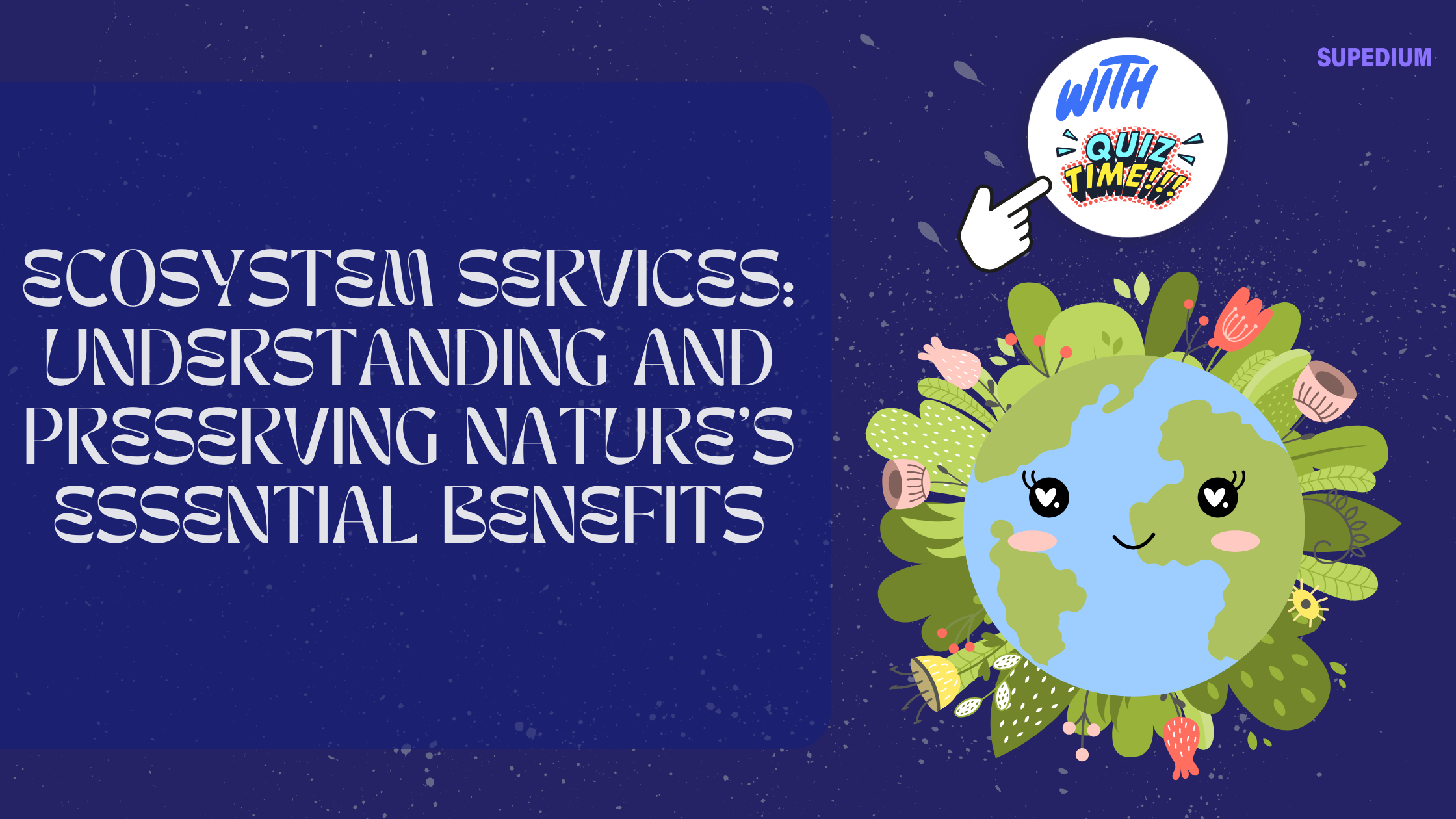Table of Contents
![]()
Introduction
Ecosystem services are the myriad benefits that natural environments provide to humanity, crucial for both ecological balance and human well-being. This concept, which acknowledges nature’s integral role in supporting life and human activities, has evolved from early observations of nature’s utility to a sophisticated field of study bridging ecology and economics.
Types of Ecosystem Services
Ecosystem services are broadly categorized into four types: provisioning, regulating, cultural, and supporting services. Each type represents distinct ways in which natural ecosystems contribute to human welfare.
Provisioning Services
Provisioning services refer to the products obtained from ecosystems. These include:
- Food: Ecosystems provide a diverse array of food sources such as crops, fish, and wild game.
- Freshwater: Natural systems like rivers, lakes, and wetlands supply essential freshwater for drinking, agriculture, and sanitation.
- Raw Materials: Ecosystems yield materials like timber, fibers, and building materials used in construction and manufacturing.
- Medicinal Resources: Many pharmaceuticals are derived from plants and animals, underscoring the importance of biodiversity for medical advancements.
Regulating Services
Regulating services are benefits derived from the regulation of ecosystem processes:
- Climate Regulation: Forests, wetlands, and oceans absorb and store carbon dioxide, mitigating climate change and stabilizing global temperatures.
- Water Purification: Ecosystems such as wetlands and riparian zones filter pollutants and sediments from water, maintaining water quality.
- Pollination: Many plants rely on animals like bees and butterflies for pollination, which is essential for the production of fruits, vegetables, and nuts.
- Disease Regulation: Natural predators help control the populations of disease-carrying organisms, reducing the incidence of diseases in humans and livestock.
Cultural Services
Cultural services encompass non-material benefits that enhance human quality of life:
- Recreational Benefits: Natural landscapes offer opportunities for activities such as hiking, bird-watching, and camping, contributing to physical and mental well-being.
- Aesthetic Values: Scenic vistas, wildlife, and natural beauty provide inspiration and pleasure.
- Spiritual and Religious Significance: Many cultures hold certain landscapes or species as sacred, reflecting a deep connection between people and nature.
- Educational and Scientific Value: Ecosystems serve as living laboratories for research and education, contributing to our understanding of natural processes and environmental science.
Supporting Services
Supporting services are fundamental processes that underpin other ecosystem services:
- Soil Formation: Ecosystems contribute to the formation of soil through the decomposition of organic matter and the activity of soil organisms.
- Nutrient Cycling: Natural processes recycle nutrients like nitrogen and phosphorus, essential for plant growth and ecosystem health.
- Primary Production: Plants convert sunlight into energy through photosynthesis, forming the base of the food web.
- Habitat Provision: Ecosystems provide habitat for a diverse range of species, which in turn supports ecological balance and resilience.
Economic Valuation of Ecosystem Services
Valuing ecosystem services is essential for integrating them into policy and decision-making. Various methods are used to quantify their economic value:
- Market-Based Approaches: These include assessing the direct economic value of goods and services, such as the market price of timber or fish.
- Non-Market Approaches: Techniques like contingent valuation and choice modeling estimate the value of services not directly bought or sold in markets, such as clean air and recreational opportunities.
- Cost-Benefit Analysis: This approach compares the economic benefits of ecosystem services with the costs of maintaining or restoring them, guiding resource management decisions.
Threats to Ecosystem Services
Human activities pose significant threats to ecosystem services:
- Deforestation and Habitat Destruction: Clearing forests for agriculture or urban development leads to the loss of biodiversity and the degradation of ecosystem functions.
- Pollution: Contaminants from industrial, agricultural, and domestic sources degrade air, water, and soil quality, impacting both ecosystems and human health.
- Climate Change: Altered weather patterns and extreme events disrupt ecosystems, affecting their ability to provide services.
- Overexploitation: Unsustainable practices like overfishing and excessive water use deplete resources and disrupt ecological balance.
Loss of Biodiversity
Biodiversity loss impacts ecosystem services in profound ways:
- Species Extinction: The extinction of species reduces ecosystem resilience and the ability to provide essential services.
- Disruption of Ecological Interactions: The loss of species can disrupt relationships such as predator-prey dynamics, affecting ecosystem stability and function.
- Invasive Species: Non-native species can outcompete native species and alter ecosystem processes, leading to declines in ecosystem service provision.
Conservation and Management Strategies
To address these threats, various strategies are employed:
- Protecting Ecosystems: Establishing protected areas and implementing restoration projects help safeguard critical habitats and ecosystem functions.
- Sustainable Practices: Adopting sustainable agriculture, forestry, and fishing practices can reduce environmental impact and preserve ecosystem services.
- Policy and Governance: International agreements, national regulations, and local policies play a crucial role in environmental protection and resource management.
- Community Involvement: Engaging local communities and incorporating indigenous knowledge can enhance conservation efforts and promote sustainable use of natural resources.
Case Studies
Examining case studies provides insights into the successes and challenges of ecosystem service management:
- Successful Conservation Efforts: Examples such as the Great Barrier Reef’s marine protection and the Amazon Rainforest’s conservation initiatives demonstrate effective strategies for preserving ecosystem services.
- Challenges and Failures: Issues like deforestation in Borneo highlight the difficulties of balancing development and conservation, underscoring the need for more robust and inclusive approaches.
Future Directions and Research
The future of ecosystem service management involves exploring new trends and innovations:
- Emerging Trends: Advances in technology and research, such as remote sensing and ecological modeling, are enhancing our understanding of ecosystem services and their dynamics.
- Policy Innovations: Integrating ecosystem services into urban planning and development, along with international cooperation, will be crucial for addressing global environmental challenges.
Conclusion
Ecosystem services are vital to human life and the health of the planet. Understanding their types, valuing their contributions, and addressing the threats they face are essential for sustainable development and environmental stewardship. Continued research, effective policy, and active community involvement are key to ensuring that these invaluable services are preserved for future generations.






Be the first to comment